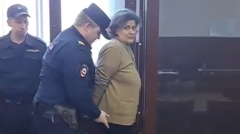Anna Alexandrova, a 47-year-old hairdresser from St. Petersburg, received a sentence of 5 years and 2 months for allegedly sharing anti-war content related to the Ukraine conflict on social media. Her conviction highlights the increasing repression of dissenting voices in Russia since the beginning of the invasion in February 2022.
**St. Petersburg Hairdresser Sentenced for Alleged Anti-War Posts Amid Crackdown on Dissent**

**St. Petersburg Hairdresser Sentenced for Alleged Anti-War Posts Amid Crackdown on Dissent**
A Russian hairdresser has been handed a lengthy prison sentence after being convicted of spreading false information about the military, raising concerns over freedom of expression in the country.
---
Anna Alexandrova, a St. Petersburg hairdresser, has been sentenced to five years and two months for allegedly spreading false information regarding the Russian military. The charges stem from eight posts she supposedly made on social media, which she maintains were motivated by a land dispute with a neighbor. This case exemplifies the growing suppression of dissent in Russia, where new laws have criminalized dissenting views on the military following the Ukraine invasion, ultimately leading to the imprisonment of various critics, including several journalists recently sentenced for association with an "extremist organization."
The conviction raises significant questions about the state of free speech in Russia, as numerous opponents of the government face similar fates amidst heightened scrutiny and stringent restrictions under the guise of national security.
Anna Alexandrova, a St. Petersburg hairdresser, has been sentenced to five years and two months for allegedly spreading false information regarding the Russian military. The charges stem from eight posts she supposedly made on social media, which she maintains were motivated by a land dispute with a neighbor. This case exemplifies the growing suppression of dissent in Russia, where new laws have criminalized dissenting views on the military following the Ukraine invasion, ultimately leading to the imprisonment of various critics, including several journalists recently sentenced for association with an "extremist organization."
The conviction raises significant questions about the state of free speech in Russia, as numerous opponents of the government face similar fates amidst heightened scrutiny and stringent restrictions under the guise of national security.



















